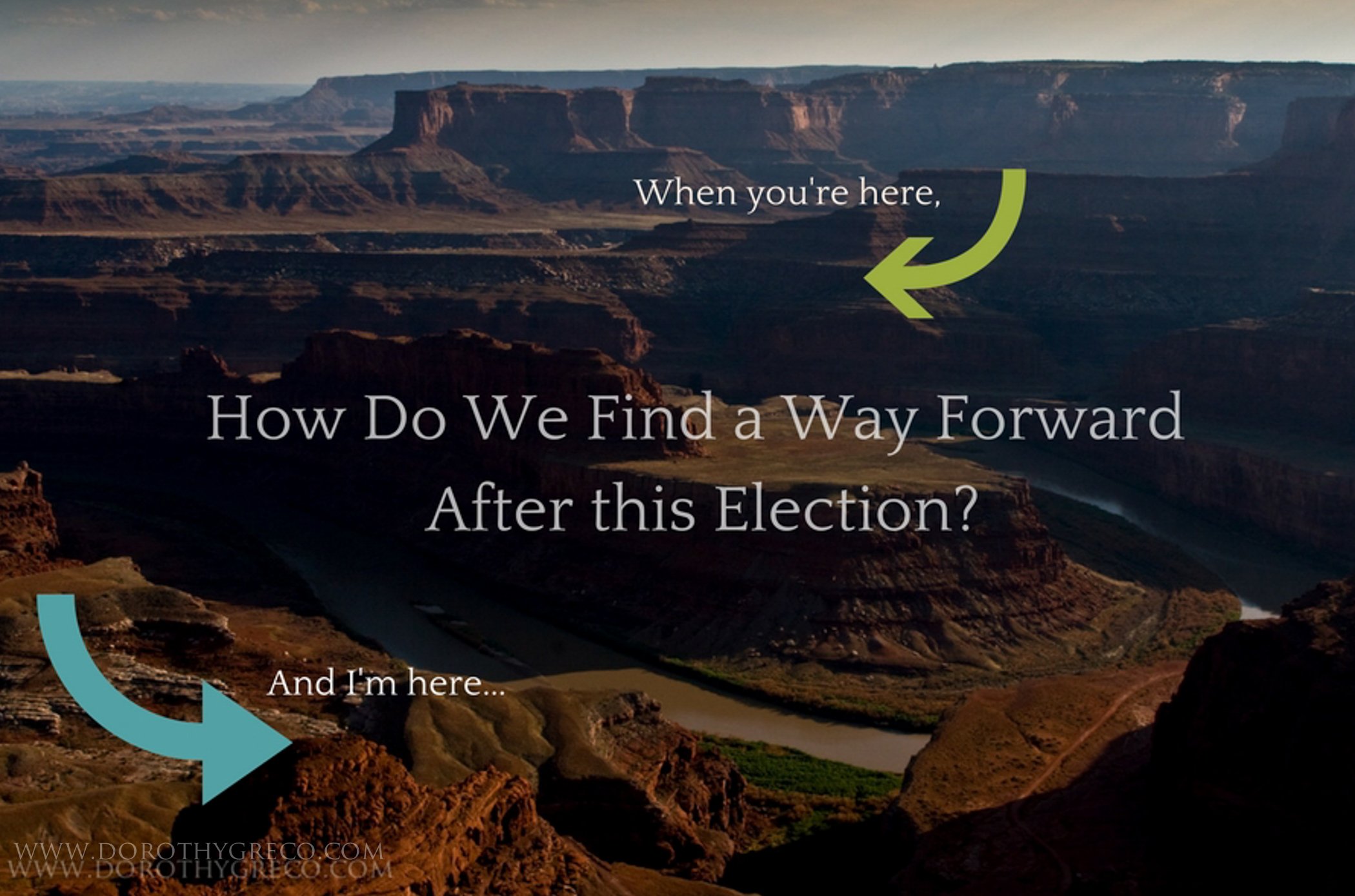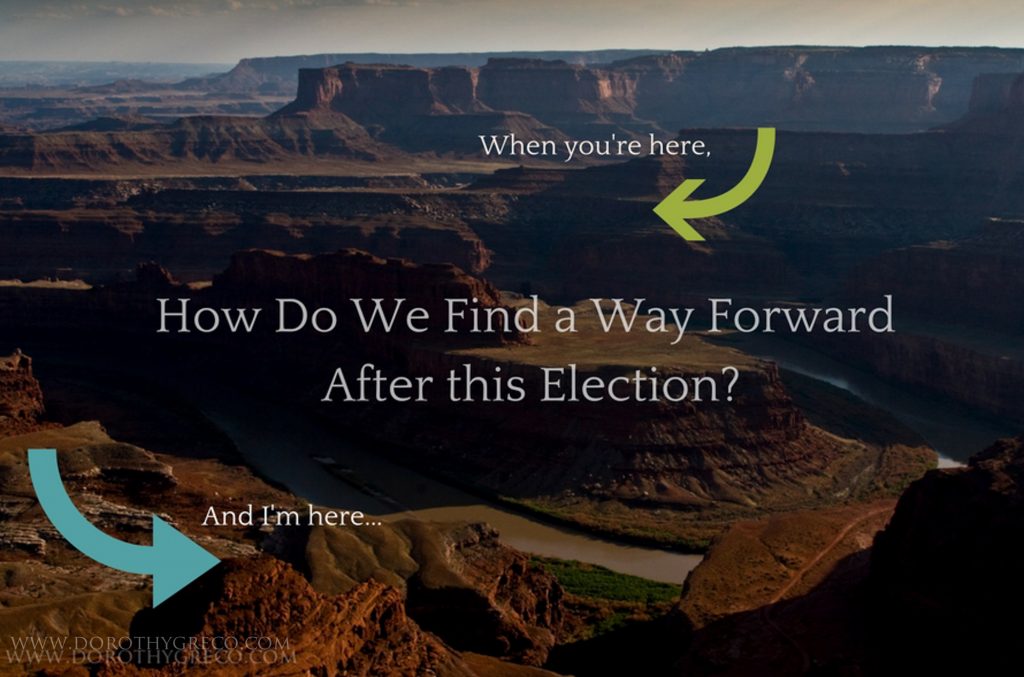The election is over but I’m not necessarily breathing a sigh of relief. In my 39 years of voting, I’ve never experienced a campaign season as ugly and divisive as this one. Words were spoken in anger. Historic wounds were exposed. Biases were moralized. As a result, friends were unfollowed or even unfriended. Regardless of which box you checked on election night, I think we can all agree it’s been a long and torturous season.
As a country and as individuals, we have some soul searching to do. Perhaps it would be wise to evaluate if or how we contributed to the mess we find ourselves in. Perhaps we could stop blaming the media, or the church, or the Republicans. Could I offer one practical suggestion? How about if we all stop trying to convince those who disagree with us that we’re right?
I could be mistaken, but I don’t think anyone who voted for Trump is interested in hearing why others consider him to be an unqualified, unfit candidate, who did little more than exacerbate race relations and make empty promises. Similarly, I don’t think anyone who voted for Clinton is interested in hearing her portrayed as a dishonest, deceitful baby killer who compromised national security.
I think we’ll move forward in healing our collective wounds if we stop defending our candidate of choice (mostly by maligning the other candidate) and instead figure out how we are going to work and live together. Because that person you unfriended? They might just plop down next to you in church this week. (Or, they might be seated by your side at the Thanksgiving dinner table.)
Where do we start? Consider if you said or did anything that hurt specific people or groups of people. It’s become obvious to me that friends who voted for Trump deeply resent some of the articles I posted on my wall where the media painted them as uneducated cretins. It’s also true that those who did not jump on the Trump bandwagon were accused of turning their backs on the innocent babies, not caring about religious freedoms, and generally acting like, well, heathen cretins. Both of these scenarios have left burn marks.
We have become polarized and binary. We determine who is in or out, based on how they voted. We have castigated our neighbors, shamed our friends, denied racism, fomented classisms, and in some situations, created substantial breaches. We don’t trust each other and far too often, we assume the worst.
So what’s to be done? If you agree that you have knowingly or unknowingly hurt someone, apologize. Your apology should never, ever, under any circumstances include the word BUT. As in, “I’m sorry that I hurt you BUT your candidate was such a (fill in the blank).” You might also want to avoid the non-apology apology by being specific and owning your words/actions. “I’m sorry you felt hurt” is not the same as “I’m sorry I hurt you.” (If you were hurt by some of my posts and have not received an email from me, I am sorry and please feel free to contact me.)
After you have admitted your mistakes, explore if you cling to any isms: racism, sexism, classism, etc. This can be difficult to see and more difficult to tease out because we often form our identity around these ideologies. If you need help here, talk to or read work from someone who sees things from a different vantage point. If you’re a white, middle or upper class Christian, ask a Muslim immigrant what their experience of the election has been. If you feel a familiar defensiveness rising up, check it rather than obey it. It might mean that you feel guilty about their experience—which might mean that you have something to learn. (It’s also possible that you’re tired or hungry but listen anyway.)
What’s key here is that we stretch, that we do the work to listen and hear the pain beneath the words of our neighbors, co-workers, or friends. If we rush in to defend our perspective without giving them the gift of listening, we have missed an important opportunity to grow and to love. Specifically, when blacks, or immigrants, or Muslims, or members of the LGBT community voice concerns about what will happen to them when president elect Trump comes into power, validate that concern rather than dismiss it. Based on many of the things that he actually said, their fears are not completely unfounded. You don’t have to agree with them but this is not the time to explain why Clinton’s emails were a more consequential offense than Trump’s caustic words. (And do keep in mind the back-story of America: even though we’ve had our first non-white president, it’s been a brutal season for minorities in this country.)
Where we find ourselves four years from now has more to do with what happens in our own houses than what happens in the White House. (Thank you Diane Kim.) I, for one, don’t want to live in a country that ignores inequalities and foments division. If we are really going to be a great country where everyone is equally valued and esteemed, we need to build bridges, not walls. Walls are easy to build. Bridges are not. Bridges need precise design and more importantly, skilled construction so that they can hold the inherent tension of supporting people as they cross over chasms. We have a chasm in our country. If we want to avoid making it deeper, we’ve all got a lot of work to do.


I am really helped by this article today,as some of my inlaws voted differently than my husband and I and we’re spending a lot of time together right now. I went into Thanksgiving not wanting to open the can of worms. Maybe a careful and respectful time of listening could occur with one of my in laws whom I care about and would honestly like to understand more. Thanks Dorothy.
I’d love to hear how it went Deidre!